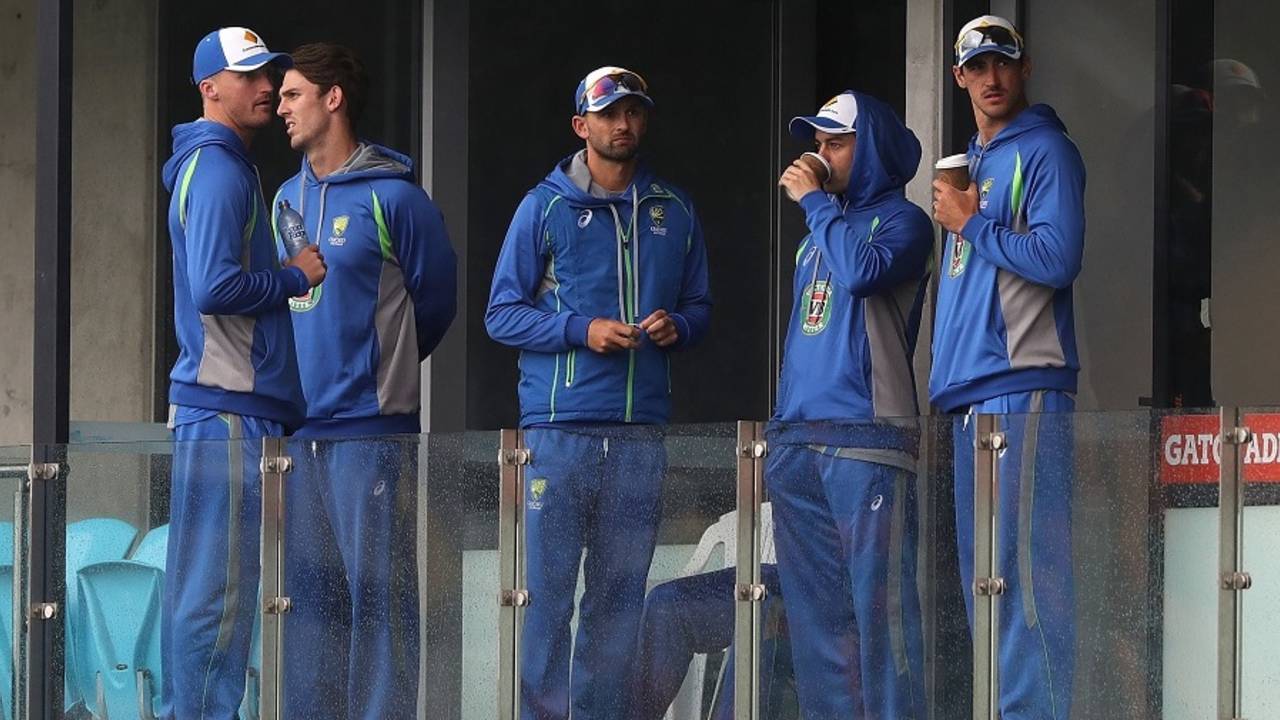Rain creates pressure on Australia to make the play
After the second day's play in Hobart was lost to rain, South Africa may be happy to slow the match down and force Australia to make the play.
Firdose Moonda in Hobart
13-Nov-2016
Not a ball was bowled on day two in Hobart • Getty Images
All right Australia, it's over to you. What has become a four-day Test has bought South Africa some luxury time. They can lean back and look to their opposition to make the move.
Although day one, with its 15 wickets, packed in enough action for two days and could still mean a result here, it is Australia who will most need to make the play. They're already 86 behind and will need to limit South Africa's lead as much as possible, then bat both big and quickly to give themselves enough runs and enough overs to bowl South Africa out.
South Africa, on the other hand, will be happy to slow things down. Even if they think there's enough time to be able to extend the lead significantly, bowl Australia out and chase, they don't actually need to force anything. A draw in Hobart means going to Adelaide to what will likely will be seamer-friendly conditions with a pack that has already plucked all ten Australian wickets for under 100, twice.
A few months ago, when South Africa's players en masse rejected the idea of a day-night Test, one of the reasons was because they thought this series was too crucial to end with a match played in unknown conditions. At that stage, it was as though South Africa did not dare to dream they may have the advantage heading there.
And that's understandable. They had come off their worst summer since readmission, losing five of eight Tests, had tumbled down the rankings from No.1 to No.7 and there were rumours of senior player retirement and an exodus from the domestic system in a time of transformation.
In less than a year, South Africa have put themselves back on track and have found a depth despite the drought. There is even a sense this new South African team could be stronger than they were before. Their Perth comeback was blockbuster material and Australia will need similar in Hobart. At least one person does not think Steven Smith's men will be able to summon the skills to do a South Africa.
Graeme Smith, the former South African captain, whose comments the team have distanced themselves from, took shots at Australia's waning cricket culture this week and has now moved on to pointing at their technical problems as well.
In a column for Sydney's Daily Telegraph, written before the second Test, Smith accused Australia's batsmen of not having the temperament required for Test cricket. "Australia don't want to work hard for their runs," he wrote. "They want to hit boundaries, they want the game to move forward, they want to be positive all the time and they're not prepared to soak up pressure and work hard for their runs."
Smith also blamed the bowler rotation policy for Australia's relative lack of bite in the pace pack, especially when compared to South Africa's. "Sometimes in modern-day sport you can over-complicate things and it seems Australia's scientific approach to managing their players has left them unsure of what their best attack is," he said. "I think sometimes the simple way is the best way. You want to keep players on the park, you want to win games, you want your best players playing all the time. To me it's actually quite simple - if a player has a niggle then he needs to rest, otherwise your best players should be playing all the time no matter the format."
That's the way South Africa have handled Kagiso Rabada, who continues to awe Australia, and was the subject of a Sunday feature in The Age newspaper.
It's not the first time South Africa have stepped up in Australia. They won their previous two Test series here. But it is the first time a South African side of relative unknowns are stepping up. That they are doing it by putting the Australian side that were not long ago ranked No.1, under such a severe amount of pressure will only add to the aura. Names are being made and reputations built, so much so that even on a day when no play was possible, South Africa still hold the upper hand.
Firdose Moonda is ESPNcricinfo's South Africa correspondent
